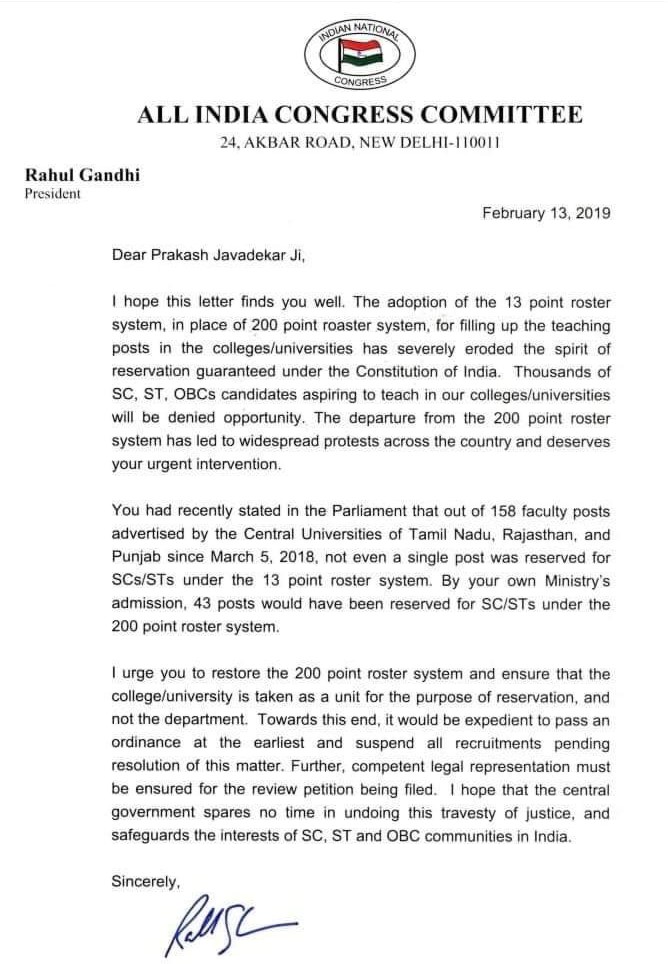In a letter to Javadekar dated Wednesday, he said that the adoption of the “13-point roster system” in place of the earlier system, has “severely eroded” the spirit of reservation guaranteed under the constitution of India and called for bringing an ordinance to suspend all recruitment till the matter was resolved.

New Delhi: Congress President Rahul Gandhi urged Union Human Resource Development Minister Prakash Javadekar to restore the “200-point roster system” of reservation mechanism for faculties in universities.
In a letter to Javadekar dated Wednesday, he said that the adoption of the “13-point roster system” in place of the earlier system, has “severely eroded” the spirit of reservation guaranteed under the constitution of India and called for bringing an ordinance to suspend all recruitment till the matter was resolved.
This is arguably the first time INC has taken a stand against the 13-point roster system and has not held a press conference or a protest demonstration against it.

Under the new system, each department is taken as a unit for implementing recruitment and reservation policy for teachers. Under the earlier system of a 200-point roster, the entire university was taken as a unit for reservation and recruitment.
“Thousands of SC, ST, OBC candidates aspiring to teach in colleges/universities will be denied the opportunity. The departure from the ‘200-point roster system’ has led to widespread protests and deserves your urgent intervention,” said Gandhi.
Gandhi also pointed out to Javadekar recently informing Parliament that of the 158 faculty posts advertised by the Central Universities of Tamil Nadu, Rajasthan and Punjab since March 5, 2018, not even a single post was reserved for SCs/STs under the ’13-point’ roster system.
“You had recently stated in the Parliament that out of the 158 faculty posts advertised by the Central Universities of Tamil Nadu, Rajasthan, and Punjab since March 5, 2018, not even a single post was reserved for SCs/STs under the 13-point roster system. By your own ministry’s admission, 43 posts would have been reserved for SC/STs under the 200 point roster system,” he wrote.
On January 31, thousands of protestors had gathered in New Delhi’s Jantar Mantar to demand the restoration of the 200-point roster. The Allahabad high court in 2016 had ruled that the 13-point roster system should replace the previous system.
The announcement of a 13-point roster by Allahabad High Court in 2016, had caused widespread protests in the country and majority in New Delhi recently in January 2019.
Following that, the University Grants Commission froze hiring of faculty members last year until the Supreme Court heard the matter. On January 22, the Supreme Court upheld the HC’s order, following which new rounds of protests occurred.
Besides the Congress, the Samajwadi Party, the Rashtriya Janata Dal and other opposition parties have demanded the restoration of the earlier system, contending the new system deprives SCs, STs and OBCs of reservation benefits in higher education institutions.
Opposing teachers explained that as opposed to the earlier system, where 99 posts were reserved for SCs, STs and OBCs and 101 for the unreserved, under the new system only the first, second, third, fifth, and sixth posts will be unreserved in a department.
Also, the fourth will be reserved for OBCs, the seventh for SCs, the 14th for STs and the eighth and 12th for OBCs, while the ninth, 10th and 11th will be unreserved.
The University Grants Commission (UGC) in March 2018 announced that a department should be considered the base unit to calculate the number of teaching posts for the reserved categories following an order by the Allahabad High Court in April 2017.
The matter is before the apex court with the Centre filing a petition seeking review of the top court’s verdict, dismissing a petition pleading restoration of the earlier system.
Inputs from IANS